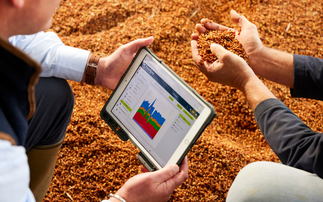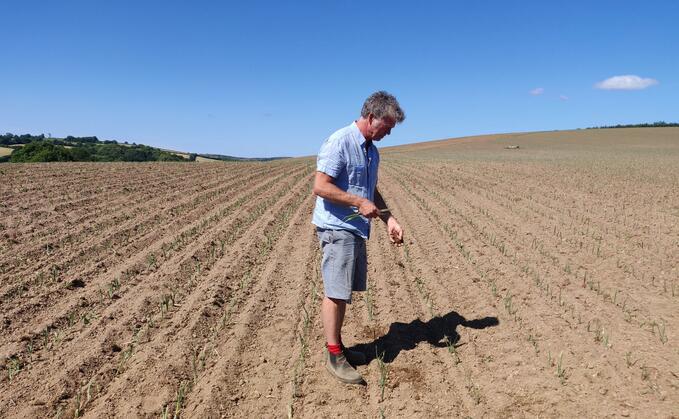
Riverford founder Guy Singh-Watson inspects the spring onion crop on his farm
BusinessGreen takes a tour around Riverford Organic Farms to explore how the veg box firm is contending with worsening climate impacts
For those who spend their lives in the countryside, city visits can feel chaotic, confusing, and loud in comparison. But as someone who has spent their entire life living in urban environments, it is the countryside which has always felt more chaotic and untamed: vast tessellations of colourful fields, governed by farming machinery and livestock, that jostle with unbridled nature and wildlife and are framed by a network of tight, winding roads that make a mockery of satnavs.
In truth, neither perception paints an entirely realistic picture. Humanity has, broadly speaking, very effectively imposed its will across both urban and rural environments, which feed and rely on each other through tightly organised supply chains, technologies, and industries.
Both the fields of solar panels Conservative leadership hopeful Liz Truss apparently loathes, and the fields of gambolling lambs she idolises are very much human constructs. There is a reason some scientists have named our current epoch the Anthropocene.
Farmers impose as much - if not more - order on their environments as urban planners. Crops are carefully cultivated against detailed plans that need drawing up seasons ahead of harvest, and farmers know that uniformity of produce is key to keeping supermarkets and wholesalers happy.
Every effort must be expended on reducing risks and unknowns, whether from changes in weather, crop disease, and livestock health, or fluctuating commodity and market prices, not to mention consumer tastes and regulatory requirements.
By necessity, modern farming has become a global, well-oiled machine. But the result, critics say, has been a proliferation of intensive farming practices that damage soils, nature, and the climate by ironing out as much unpredictability as possible from the natural world through pesticides, hulking machinery, and crop homogeneity.
George Monbiot's latest book, Regenesis, is the latest in a string of studies to warn how essentially extractive agricultural practices are damaging soils and biodiversity to such an extent that food security is being threatened.
The outlook is certainly worrying. Soils are critical for cultivating crops, maintaining flood protection, sequestering carbon, and supporting biodiversity, but the UK government estimates two million hectares are at risk of erosion, a further four million are threatened by compaction, and 300,000 hectares are contaminated.
While UK soils still store around 10 billion tonnes of carbon - equal to around 80 years-worth of annual UK emissions - intensive agriculture has caused arable soils to lose around 40-50 per cent of their organic CO2. Overall, soil degradation was calculated in 2010 to cost the UK £1.2bn every year.
High levels of nutrients applied to land as fertilisers and manures - as well as eroded soil and pesticides, herbicides and fungicides - are polluting watercourses and damaging habitats. The climate impact of farming practices are significant too - in the UK, agriculture and land-use are responsible for around 12 per cent of greenhouse gas emissions, including almost half of the country's methane emissions. Food waste and the increasing cultivation of crops for bioenergy are both serving to further increase these impacts.
In effect, unsustainable, intensive farming practices may have sustained mass production of meat, dairy, and crops for decades, but they are now biting the hand that feeds us. Concerns over the on-going ability of agricultural yields to keep track with growing demand are further amplified by geopolitical disruption, such as the war in Ukraine, and worsening climate impacts such as the heat waves and droughts that have afflicted much of the northern hemisphere this summer. Agricultural businesses and traders of agricultural commodities find themselves facing an increasingly volatile future defined by changing demand patterns, stranded assets risks, climate impacts, emerging technologies, and the mounting fear that food security is being eroded.
But ripples of change are starting to emerge, amid growing awareness that farming does not have to be unsustainable, nor unprofitable. As concerns over the climate and environmental crises have risen in recent years, more and more companies are being forced to look deeper into the environmental and reputational risks in their supply chains, prompting growing numbers of food firms and farmers to reassess their practices.
For farmer Guy Singh-Watson, it is a journey he started out on 35 years ago, when he began supplying organic vegetables from the Devon farm on which he grew up to supermarkets, before later turning Riverford Organic Farms into a hugely successful veg box delivery company.
Having started out delivering organic vegetables to friends and family in the 1990s, Riverford is now a multi-million-pound business which saw its veg box sales surge to 85,000 a week during the Covid-19 lockdown in 2020. But from the very beginning, environmental sustainability has been at the forefront, and it continues to drive Singh-Watson's ambitions today.
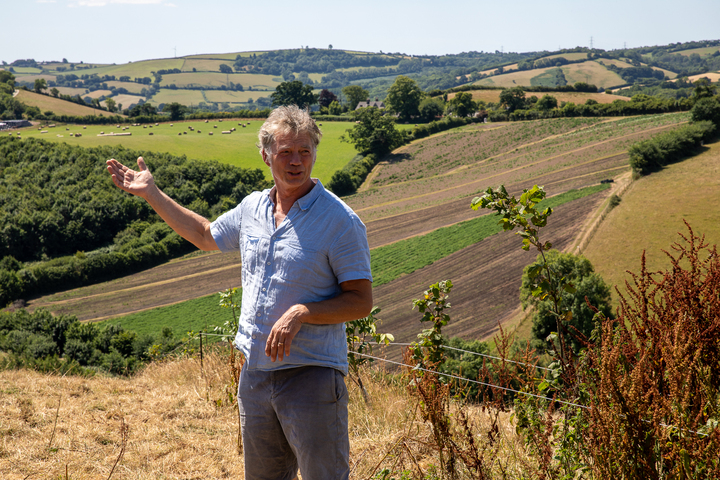
Defining 'regenerative' agriculture
Whether it is a concept, or merely a buzzword, regenerative farming has certainly started to catch on in recent years. It is not a specific practice in itself, but an umbrella term that generally implies sustainable approaches to farming that conserve and rehabilitate soils, nature, and watercourses, while increasing biodiversity and climate resilience.
Not long ago, these ideas were at the fringe of agricultural thought, but now global brands and corporations such as Nestle, Guinness, McCain and even Google are investing heavily in more natural, regenerative farming projects and technologies.
Two years ago the world's largest retailer Walmart also pledged to become a 'regenerative', net zero emissions company by 2040, backed by a target to protect, manage or restore 50 million acres of land and one million square miles of ocean by the end of the current decade. "We want to play an important role in transforming the world's supply chains to be regenerative," supermarket giant's CEO Doug McMillon said at the time. "We face a growing crisis of climate change and nature loss, and we all need to take action with urgency."
Trouble is, there is no agreed concept, framework, or universally-used certification scheme governing what constitutes 'regenerative' in terms of food and farming. Although many of the ideas underpinning regenerative agriculture derive from age-old approaches for harnessing nature - rather than fighting against it - that pre-date modern intensive farming, for much of today's global food industry it is an entirely new frontier.
Marine O'Connell, founder of biodynamic farm and education scheme the Apricot Centre in Dartington, just down the road from Riverford's base, has known and worked with Singh-Watson for years. She is a big regenerative farming advocate, having written a book on how to design such approaches in to food systems, but argues the relative lack of clarity around what 'regenerative' farming precisely entails could well prove to be an advantage.
"Regenerative agriculture is generally thought of as an emergent term," she says. "That means it is not fixed, which might be quite irritating on one level, but on the other hand it means we can try and fix it ourselves; we can try and say what we think it is."
O'Connell sees the concept as being different for different entities. For a large farming or food company, it might mean steadily reducing intensive agricultural practices and fertilisers, while for organic farmers it may mean going above and beyond current certification standards through efforts such as adding more trees and rewilding.
"I see it as a spectrum, and a process for moving everyone in the right direction," she reasons.
Singh-Watson admires the optimism behind the present push for regenerative farming, but worries that it risks becoming merely a meaningless buzzword that is used to enable corporate 'greenwashing'. "I do love the fact that it is a broad church… but I can't help but feel a bit worried that it will be used by less scrupulous brands, and there will be in-fighting about what it means," he says. "That does concern me a little bit."
Riverford's vision
Still, whatever term Singh-Watson prefers to use for it, the self-confessed "veg nerd" is passionate about promoting more climate and nature friendly farming, and the 'unfixed' nature of the regenerative farming movement may well suit him and his business down to the ground, as he strives to provide a template for more planet-friendly farming.
In 2018, Singh-Watson sold his majority stake in Riverford Organic Farms to his staff via a newly established employee trust. But he still owns and lives on another farm next door - Baddaford - where he and his team grow a range of organic fruit, vegetables and nuts which supply Riverford, as do many other smallholder suppliers in the area.
Following the revenue windfall the company enjoyed in 2020 as many locked down Brits took to ordering food boxes, Singh-Watson used some of the proceeds to invest in a range of climate and biodiversity projects, and he and his team of farmers and suppliers continue to experiment and tweak their practices to boost both quality and sustainability.
Out in the fields, the company eschews pesticides, fertilisers, and hulking machinery that digs up and disturbs topsoil in favour of myriad tweaks and techniques that differ depending on the crop and location. For leeks, for example, the trick is to avoiding weeds is to use good compost - of which Riverford is producing more and more of its own - rather than manure that can contain seeds, and to mow off the weeds straight away after sewing the crops to stop them growing back.
Labour can cost up to £1,000 an acre to manually pull out weeds, but if you plant leeks properly you can avoid that, Singh-Watson explains.
"Compared to early days the amount of manual weeding we do is really minimal," he says. "Labour is by far the biggest cost in farming, and it's back-breaking work - that's why so many farmers just spray their crops instead."
Meanwhile, the company's greenhouses - or polytunnels - have proven a major success, with some of older ones having been installed a quarter of a century ago. Here, Riverford grows many of its organic tomatoes and cucumbers, producing around 40,000 to 50,000 tonnes per year of each, and they allow the firm to grow delicate vegetables all year round without artificial lighting or heating. There are plans to add more, and Ed Scott, Riverford's polytunnel manager, often experiments with new crops or varieties. "You never know when something might come down with a disease, so I'm always trying out a few varieties," he says.
To keep pests such as aphids out, Scott uses their natural enemies such as parasitic wasps and lacewing larvae - or "beneficial insects", as he calls them.
By avoiding pesticides and encouraging natural predators, it also helps to encourage biodiversity and wildlife on the farm. Another example is an orchard that Riverford established elsewhere on the farm three years ago, which is provides an excellent foraging ground for bats.
While the UK's bat population has seen a near 90 per cent decline over the past century or so, one of the country's largest maternity roosts of around 2,000 bats lies not far from Riverford, and encouraging them to forage at the farm also acts as an excellent form of pest control.
"More and more of these types of controls are being used in conventional farming," Scott tells BusinessGreen. "You want a base level there of beneficial insects waiting for when the predatory insects appear."
And then, finally, once fruit, vegetables, salad leaves and nuts have been harvested, they are sent to Riverford's on-site packing warehouse ready to be sent out in cardboard boxes and compostable, plastic-free packaging to its customers. The warehouse is powered by 100 per cent renewable electricity, and the veg boxes themselves can be folded up and collected by Riverford to be used again. The farm is both a slick commercial operation and a giant laboratory of experimentation seeking to respond to unpredictable weather patterns and worsening climate impacts all in one.
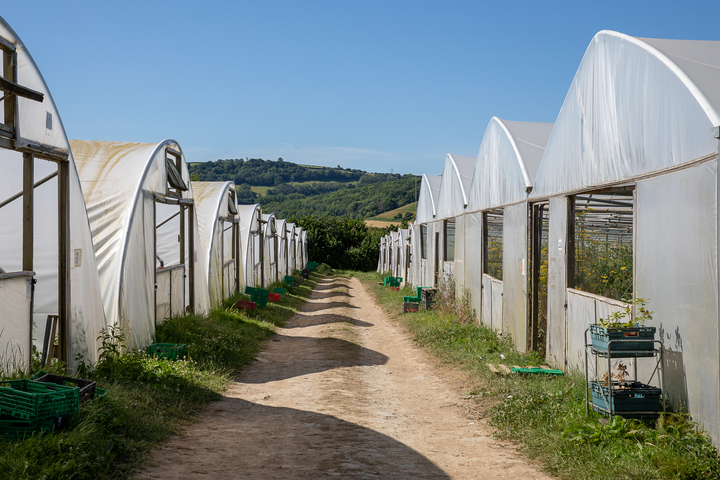
Risky business
Speaking to Singh-Watson and his team and partners as they guide us around both Riverford and Baddaford drives home how much of an extraordinarily complex and risky business modern farming has become.
BusinessGreen visited the farm during that balmy mid-July period just days before the record-breaking heatwave which saw temperatures soar above 40C. There had been little rain throughout the spring and a few weeks later much of England would officially be in drought, with rivers, lakes and reservoirs drying up and water companies declaring hosepipe bans.
The fallout for UK agriculture and food security is expected to be disastrous, with around half of the nation's potato crop expected to fail as it cannot be irrigated, on top of losses ranging from between 10 to 50 per cent for staple crops such as carrots, onions, sugar beet, apples and hops.
Riverford publishes its own online magazine, the exquisitely titled Wicked Leeks, offering recipes and advice to customers and growers, as news and updates from the farm, all pushed out by email and across the firm's social media account. But it is also an outlet for Singh-Watson's enthusiasms and frustrations through frequent missives, thoughtful views and the occasional rant on farming policy, climate change, and sustainability.
And, all told, the newsletter offers a fascinating glimpse into the trials and tribulations of operating a farming business during a time of acute climatic, geopolitical and economic challenges.
Amid current challenges one recent post particularly catches the eye, in which Singh-Watson offers a refreshingly honest take on what looks set to be only the third summer in 35 years that the farm has not had enough water to keep crops growing. Under the heading 'How could we be so stupid?', the Riverford founder reflects on a visit 10-years ago from a Met Office expert, who advised Singh-Watson to invest in reservoirs, field drainage, and polytunnels in preparation for volatile weather patterns driven by climate change characterised by long periods of drought interspersed with sudden heavy rains.
Since then, he explains, the farm has more than doubled its polytunnels and volume of water storage "but it still isn't enough to provide resilience to the changes we are now seeing".
"We did come close to building another 10,000 square metres of water storage after the drought of 2018, but with so much uncertainty around farming post-Brexit, it was hard to justify an investment with a 50-year return," Singh-Watson writes.
But of course, faced with the "catastrophic" commercial loss of vast amounts of valuable crops this year - such as broccoli, sweetcorn and cabbages - that investment in another on-site reservoir retrospectively looks like a good bet. As a lesson on the dangers of ignoring climate threats, and the huge value of investing in resilience and decarbonisation, there could scarcely be a better exemplar.
"Doing nothing and hoping for the best is not the way to fight, or cope with, climate change," Singh-Watson concludes. "We should have spent the money, and so should our water companies."
Cultivating more resilient crops
The immensely challenging, dry, hot summer does offer some potential bright spots for Riverford, however. Peppers, aubergine, and chillies have been thriving in the heat this year, with the farm expecting to double its expected yield of Padron peppers, and it hopes bumper sales of these crops can help make up some of its financial losses elsewhere.
Clearly, ensuring diversification of crops that thrive in different weather conditions is one way to build business resilience to climate challenges. But Singh-Watson is also passionate about another means of boosting resilience on his farm: perennial crops.
Singh-Watson points to Uganda as an exemplar of these ideas, which have been part of local agricultural culture for generations. "I've spent a fair amount of time in East Africa working with farmers in Uganda, where I've been inspired by the agriculture there - but they don't call it organic, permaculture or regenerative," he explains. "In Uganda they grow a lot of cassava [an annual crop], maize and bananas [perennials]. If the rain fails, they may not have maize, but they've still got cassava."
Unlike annual crops, perennials do not need to be replanted every year, and automatically grow back after harvest, which eliminates or significantly reduces the need for tillage that disturbs and damages the soil.
Cultivation of such crops can therefore boost soil health, resilience, and carbon sequestration, and - as perennials tend to be deeper rooted than annual crops - they hold their moisture more efficiently and can better filter pollutants such as excess nitrogen. Perennial crops therefore require fewer pesticides and fertilisers, and can rarely require watering, with or without much rainfall. What's more, some perennials can yield harvests several times in one year.
For that multitude of reasons, Singh-Watson and his growers have been increasingly experimenting with perennial crops such as fruit, nut and edible berry trees and shrubs at Riverford, Baddaford and beyond, while expanding cultivation of other common perennial staples such as rhubarb, kale, beetroot, artichokes, and asparagus.
Perennials used to be far more common, but that has gradually shifted over millennia as humans took over and built today's monoculture of annual crops that are more susceptible to disease. Today, over 80 per cent of all farmed crops are annuals, whereas in nature, over 90 per cent of plants are perennials, which critics cite as evidence of the 'unnaturalness' of modern farming.
And so, understandably, there has been surge of interest in perennials around the world in recent years, with agricultural scientists seeking to develop perennial versions of staple annual crops such as rain and rice to help feed growing populations in an increasingly volatile climate. Interestingly, Monbiot's new book similarly concludes that perennials have a major role to play in the emergence of a more sustainable agricultural sector, alongside the emergence of various high tech alternative proteins.
"It's not just about less work, it's about cultivating crops for the future and growing in a different way," Singh-Watson explains. "Perennials require fewer inputs, with more benefits."
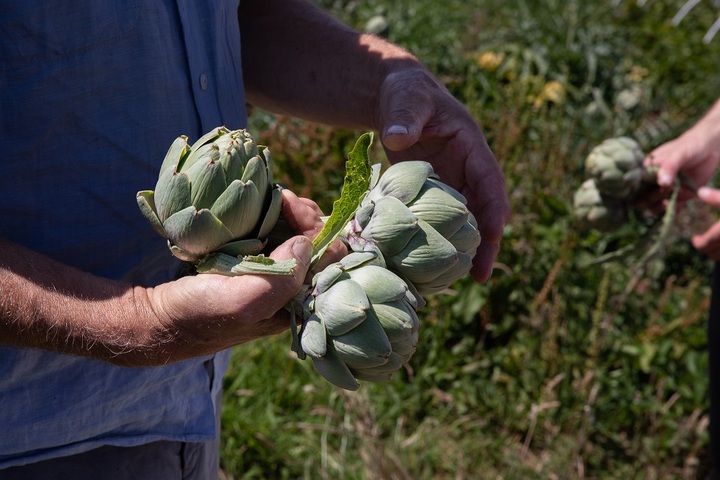
The cost of food
Singh-Watson and his team and associates at Riverford may not have all the answers for tackling the systemic challenges shaping an increasingly risky, climate-hit and yet utterly indispensable industry. Few, if anyone, does, and every piece of land comes with its own individual set of challenges and characteristics that require a different set of approaches.
But whatever urgent changes are required to deliver a sustainable, secure and equitable food system, it is clear they cannot be shouldered solely by farmers. A transformation is required in how food is viewed in Britain and beyond. That may mean eating more local, seasonal, and better quality food - and yes - cutting down on meat, but also tackling the externalities imposed by conventional farming.
Singh-Watson points to government policy as key to driving reforms across the sector. For him, fossil fuels are the major driver of rising costs right across the economy, while also being ultimately responsible for greenhouse gas emissions that are embedding deeper risk and volatility into the food system. "If you taxed fossil fuels, that would make agro-ecological farming more competitive," he argues. "Heated glass houses and air-freighted vegetables would be gone straight away. If you internalise those external costs it would at least get rid of the very, very worst insanities in our food system, and swing things back a little bit towards local production. That would be a very good first step."
For farmers everywhere in the world, the next year is sure to be one of the toughest in recent memory, but it also comes at what could prove to be the cusp of a new epoch for the food system marked by both volatility, unpredictable weather, and insecure supply, as well as new approaches to food production that are both high tech and in tune with nature. The hope is that this year's disruption, with forecasts of worse yet to come, may act as a wake-up call that delivers the quantum leap in adaptive, climate friendly farming that the world urgently needs.
This article is part of the Net Zero Commodities Hub, hosted in partnership with Wood Mackenzie.
Want to find out more about the net zero transition and how businesses are seizing the opportunities on offer? Sign up now for the Net Zero Festival, which will take place in London on September 28th and 29th.





